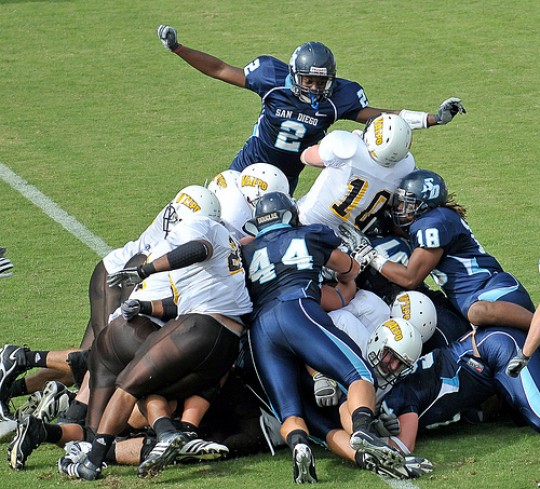Study suggests teens are more vulnerable to effects of sport-related concussions
Study suggests teens are more vulnerable to effects of sport-related concussions

Teenage athletes who suffer a concussion may be more sensitive to the effects of the head trauma than either adults or children, according to research by Canadian scientists.
In the study, nearly 100 male athletes who played soccer, hockey, rugby or football underwent a series of traditional neuropsychological tests designed to measure their cognitive abilities. They also had their brain waves monitored using electroencephalography (EEG) while they played a computerized game requiring working memory. Participants were divided into three groups: adults, children ages 9-12 and adolescents ages 13-16. Roughly half of the volunteers had experienced a concussion six months earlier.
MSNBC reports that in comparing the results researchers found:
Teens between ages 13 and 16 who had experienced a concussion had worse working memory abilities compared with teens their age who had not had a concussion. This difference was not seen in children ages 9 to 12, or adults.
And although EEG tests showed brain abnormalities in all of the participants who had concussions, the difference from healthy people was largest for teenagers. Neuronal responses in teenagers were weaker and less efficient compared with those of the other groups, [said lead researcher Dave Ellemberg, PhD, a neuropsychologist at the University of Montreal].
…
The findings demonstrate that, contrary to what some may believe, children’s brains are not more resilient after a concussion than adult’s brains. Sports teams should have a plan to manage concussions in children and teen athletes, and have athletes assessed by a physician before they return to play, Ellemberg said.
By Lia Steakley
Stanford University Medical Center
Photo by SD Dirk
###
* Stanford University Medical Center integrates research, medical education and patient care at its three institutions – Stanford University School of Medicine, Stanford Hospital & Clinics and Lucile Packard Children’s Hospital.
** The above story is adapted from materials provided by Stanford University School of Medicine
________________________________________________________________




















